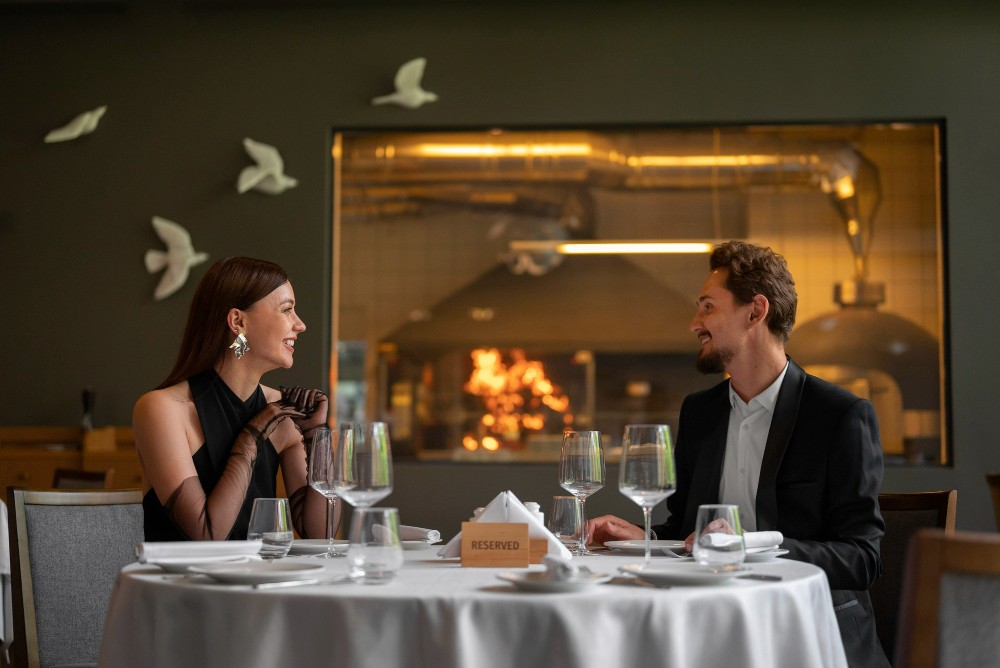It’s not uncommon for restaurants to charge a reservation fee, especially on busy nights or during their peak seasons. But should you require a reservation deposit at your restaurant?
Research shows 20% of diners don’t show up for a reservation they made. While the reasons behind no-show guests vary, roughly 45% of guests don’t cancel because they can’t find information about canceling.
Not to mention, 27% of guests “can’t be bothered” to cancel, while 18% don’t cancel because they forgot they made a booking.
You’ve probably been the victim of no-show guests in the past.
But does that mean you should always charge reservation deposits?
The following is a short guide on restaurant reservation deposits. We’ll show you the different types of deposits and fees and how to collect them and secure advance revenue to grow your business.
What is a restaurant reservation deposit?
A reservation deposit, also known as a reservation fee, is when a guest pays a deposit to book a table. Think of it as a down payment that is later deducted from the final bill.
Alternatively, a restaurant may return the deposit once the party arrives, and before they order their meal.
Why do restaurants take deposits?
Reservation deposits are becoming increasingly common in the restaurant industry, especially for popular venues and high-demand times. While not all restaurants take deposits, the practice has become more widespread because of no-show guests and last-minute cancellations.
There are 4 main reasons why restaurants ask for deposits. They are:
Securing revenue
By asking for a deposit, restaurants can ensure a portion of their revenue even before the guests arrives. This can contribute to improving revenue generation and profit margins.
Reducing no-shows and cancellations
Apart from revenue, the primary reason restaurants ask for deposits is to reduce the number of no-show guests and last-minute cancellations.
Some restaurants may require deposits for larger groups, like 4 or more people, or on certain days like the weekends.
The larger the group, the more seats and tables they occupy. If they fail to show up, the restaurant suffers because they will often turn away walk-in guests because of the reservation.
No-show guests can impact a restaurant’s revenues, causing up to 15% decline in sales.
Reducing food waste
Another reason restaurants ask for deposits is to reduce food waste. If a concept is aware of the number of guests coming in each day or during weekends, they may order larger amounts of food and fresh produce.
However, when guests don’t arrive, this food goes to waste.
Restaurants in the United States could each produce up to 50,000 pounds (22,600 kg) of food waste per year.
Financial wellbeing for the business and staff
Last but certainly not least, when a restaurant is able to maintain its profit margins and sees fewer no-shows and cancellations it can maintain its restaurant staff.
Not only that but staff, including hosts, waiters, reservations and guest relations personnel, can feel more secure in their jobs. There are fewer chances of layoffs or downsizing.
Want to take deposits directly from your website and Google Reserve?
With Servme Payments, you can collect deposits, prepayments, and no-show fees online, all while syncing bookings from channels like Google Reserve, Facebook, Instagram, and Tripadvisor.
Types of restaurant reservation deposits
There are 3 main types of reservation deposits for a restaurant. Using them will depend on the type of restaurant you manage.
Reservation fee
The restaurant reservation fee, or deposit, is money collected in advance to book a table.
Usually, the deposit depends on the number of people booking the table. So, if a group of 4 people makes a booking, they pay $20 per person as a reservation fee.
Alternatively, you may require a deposit for the table regardless of the number of guests. Let’s say $100 per table.
When guests arrive, place their orders, and have their meal, the restaurant deducts the reservation deposit from their bill.
Prepaid booking
An alternative to restaurant deposits is a prepaid booking. This is common among restaurants with a fixed-price menu (prix-fixe menu).
In this case, the restaurant requires the full upfront payment. The fee paid is per person not per table.
Often a prix-fixe menu involves a full course meal or a set menu with soup, an appetizer, and a main course, dessert or beverage.
Many hotel restaurants require prepaid bookings, especially during the holidays or the restaurant’s peak season.
This is also common with special events and seasonal menus. From special Halloween menus to events like Valentine’s Day, Mother’s Day, or even Ramadan.

Further reading: 15 Reasons to Use Restaurant Event Management Software
Cancellation or no-show fee
An alternative to a reservation fee is a cancellation or no-show fee. When a restaurant collects guest information, they ask for credit or debit card details.
If a guest fails to show up or cancels at the last-minute, usually less than 24 hours before their scheduled reservation, the restaurant charges a no-show or cancellation fee.
Some restaurants that charge a restaurant deposit may hold the deposit if the guest doesn’t show up.
Free Resource: Restaurant Deposit & Cancellation Policy Templates
Get ready-to-use templates for deposits, cancellations, and no-show policies.
How to collect reservation deposits at your restaurant
There are many ways a restaurant can collect reservation deposits.
There is, of course, the old school way of asking guests to come in and pay a deposit. However, with the option of online reservations and payments, it’s much easier to collect deposits online.
In this section, we’ll show how to collect deposits easily and how to simplify the process for your guests and staff alike.
Use a reservation system

One way to manage reservations, along with waitlists, is to use a restaurant reservation management system, like Servme.
A reservation system helps you collect online payments, including deposits, prepaid bookings, and cancellation and no-show fees.
It also helps you get more online reservations through booking platforms and integrations such as Zomato, Tripadvisor, and others.
Servme also helps restaurants increase sales by integrating with platforms like Reserve with Google and Facebook and Instagram. Through these platforms, guests can make restaurant bookings and pay deposits (if needed).
Servme’s restaurant reservation software also helps you create and manage email, SMS, and WhatsApp marketing campaigns, send automated guest surveys, and more.
Using the reservation widget, you can collect guest data to use for creating personalized dining experience and to build your restaurant CRM.
Further reading: Hyatt Regency Dubai Venues Boost Retention with 88,000 Guest Profiles using Servme
Send reservation reminders

One of the top reasons guests don’t cancel reservations is because they’ve forgotten they’d made a booking.
Using reservation software like Servme, you can send reservation reminders via your guests’ preferred method of communication.
Restaurants using Servme can send automated reminders via WhatsApp, SMS, or email. Reminders can reduce cancellations and no-shows.
Make sure you send your reminders before the cancellation window is over so guests have time to decide if they’ll come or cancel without losing their deposit or incurring a cancellation fee.
Some restaurants let guests make free reservations but will only confirm the reservation once the deposit is made. You can use the automated reminders to notify guests that their booking will be canceled if they don’t pay the deposit.
Send them a link to make the payment online and tell them about your reservation policy.
Create clear policies
Before you can collect deposits, it’s important to explain to guests your reservation and deposit process. Make sure you clearly state your cancellation and/or no-show policy.
If you’re using Servme’s reservation management software, you can add your policies in the reservation widget. They will appear before a guest completes a booking so they know what’s going to happen next.
You can also use the policies section to list dress code requirements, working hours.
Further reading: How to Make the Most of Servme’s Restaurant Table Management Software
Decide when you want to take reservations
Not all restaurants take deposits and not all concepts need to. Some restaurants opt for bookings during weekends and peak seasons.
Meanwhile, smaller restaurants with limited-seating or in high-traffic locations may require reservation throughout the week.
Explain why you use reservation deposits
The reason guests wonder why restaurants ask for deposits is because they’re not aware of the behavior of other guests. Or sometimes even their own.
That’s why offering a simple explanation about why you require restaurant deposits can help guests be more decisive and less hesitant when paying the deposit.
Further reading: 10 Money-Making Revenue Management Strategies for Restaurants in 2025
New: Servme Payments now works with Google Reserve. This means if you’re already taking payments with Servme, you can also collect deposits directly from Google searches and Maps listings.
Frequently Asked Questions About Restaurant Deposits
Should you impose a restaurant deposit policy?
It depends. Many venues take deposits for peak days, weekends, or large groups to reduce no-shows and secure revenue.

When should a restaurant require deposits?
For busy nights, holidays, special events, or when seating is limited.
What does deposit upon booking mean?
Guests must pay a set amount when booking to confirm their reservation.
How much should a restaurant deposit be?
Typically 10–30% of the expected bill, or a fixed per-person/table fee.
Can you refund a restaurant deposit?
Yes, based on your cancellation policy. Refunds usually apply if guests cancel within the free-cancellation window.
Do deposits help reduce food waste?
Yes, accurate guest counts help you order the right amount of fresh produce.
Is there a template I can use for reservation deposits?
Yes, download our ready-to-use reservation, cancellation, and no-show policy templates.
Is it legal for a restaurant to charge a reservation fee or deposit?
Yes, in most countries. Deposits are deducted from the bill or refunded upon arrival, per your policy.
What is a cancellation fee?
A fee charged when guests cancel after the free-cancellation window, often equal to the retained deposit.
What is a no-show fee?
A fee charged when guests fail to show without canceling. Similar to a cancellation fee but without notice.
Wrapping it up
Whether you manage a stand-alone venue or a multi-location restaurant, reservation deposits can be a powerful way to secure revenue in advance, reduce no-shows, and protect your margins.
The key is transparency; clearly explain your policy, make it easy for guests to pay, and ensure their information is secure. And remember, deposits aren’t just about the money. They also help you plan better, reduce food waste, and create smoother operations for your team.
Servme helps restaurant owners and managers manage the entire guest experience. With Servme’s Payments module, you can:
Collect deposits, prepaid bookings, and no-show fees online
Accept payments directly from Google Reserve, Instagram, Tripadvisor, Zomato and more
Automate reminders so guests never forget their booking
Track and report deposit revenue effortlessly
Ready to start securing advance revenue and eliminating no-shows? Book a Free Demo and see how Servme can help you set up restaurant deposits in under 24 hours.
Nada Sobhi
Payments
Tips and Insights to help you run a better business
Restaurant growth insights, delivered monthly
Join 4,000+ restaurant operators receiving marketing tips, guest experience best practices, and product updates in their inbox.



